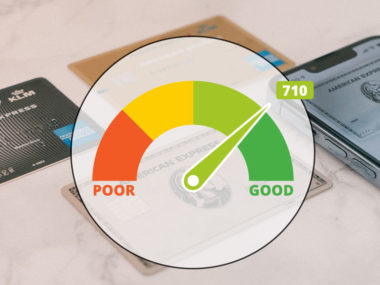Your credit score — a combination of financial factors that identify your ability to pay back loan debt — is one of the most important indicators of modern fiscal health. From mortgage and auto loans to apartment rentals, your credit score is an important determining aspect in obtaining loans for some of life’s important milestones.
Credit scores are oftentimes confusing before explanation. Determining your credit score means first comprehending all parts of the equation that make up the score itself.
Essentially, your credit score of 770 is a representation of five independent contributing financial factors —
- Payment history.
- New credit.
- Credit type.
- Credit history.
- Total debt.
Together, these factors determine creditworthiness any time you are considered for a loan.
Here’s the good news: your current credit score of 770 officially ranks as “Very Good,” according to FICO’s official rankings. Your positive credit score will influence your ability to secure new lines of credit, obtain loans at reasonable finance rates, even unlock rewards-based credit cards through your financial institution or credit card company.
Further improvement would mean a credit score of at least 800, when your credit score would then rank as Exceptional, the highest available ranking tier.
Table of Contents
Why Your Credit Score Is 770
While it’s impossible to identify the exact reasons behind your credit score, common financial factors like payment history and total debt are certainly influences. Learn more about the specifics of potential contributing factors to your credit score of 770 below.
History of On-Time Payments
With a credit score of 770, you’ve likely established a history of on-time payments to your bank, credit union, financial institution, or credit card company. Though there is no set amount of time that equates to a credit score increase, successive on-time payments generally improve credit scores consistently as months pass.
Not only have your credit payments been made before their deadlines; they have been paid in full, without a missed payment compromising your payment record to date. To further improve your credit score, look to maintain payment consistency for the foreseeable future.
A credit score of 770 also means you’ve made a habit of strict balance control. You commit to paying down the balance on any active credit cards before the balance itself becomes an issue, and before interest rates increase unpaid balances even further.
Minimized Total Debt
Controlling total owed debt is a great way to increase your overall credit score. And with a credit score of 770, this is likely a practice you’ve already integrated into your regular credit routine.
As total debt is the second-highest overall contributing factor to a credit score, it’s important that overall debt is quickly and consistently paid off. Financial institutions like to see not only a continually diminishing debt amount, but also a small remaining balance relative to the original loan amount.
Minimizing your total debt also means controlling the ratio of incoming to paid debt. Your respective monthly income might mean you have more available room to accrue new debt each month, as long as you’re paying off existing debt at an equal or greater rate.
Controlled Spending Habits
More often than not, individuals with a credit score of 770 have learned to discipline their overall spending habits. Paying off debts means first having the available finances to do so. This means dedicating a portion of your salary, hourly wages, or other income each month or each pay period to the debt itself.
Controlled spending habits require disciplining yourself to refrain from unnecessary purchases, especially sizable ones that might even require new lines of credit or additional hard inquiries.
What Can You Do With a 770 Credit Score?
Credit scores unlock increased potential for benefits such as new lines of credit, additional loans, and higher payment ceilings. And with a Very Good credit score of 770, you’re easily in line for these benefits and more. Consult the below information for even more details on the opportunities a 770 credit score allows you to pursue.
- Personal loans are even easier to get with a high credit score. This means lower-interest loans and higher overall loan amounts, often with shorter wait times before approval, all from more reputable financial institutions.
- Rewards-based credit cards are an option with a credit score of 770.
- Whether you’re looking to earn frequent flyer miles, accrue points towards vacations or getaways, or simply return a percentage of your spend to savings, you can unlock the best rewards-based credit cards with a Very Good credit score like yours.
- Mortgage loans are pretty simple to obtain with a credit score of 770. While you won’t be able to secure the lowest possible interest rates, you can secure the mortgage itself and take major steps toward owning property.
- Auto insurance rates may also come down with higher credit scores like yours. While you won’t be able to unlock a bottom-barrel rate, you’ll still be able to save money and secure your vehicles at affordable overall pricing.
A very good credit score of 770 helps you spend your money in the ways you want to, whether that means a new credit card or a new line of credit. Further improvements to your credit score can mean even high rewards and lower interest rates.
How to Improve a 770 Credit Score
While a credit score of 770 is certainly positive, significant improvements are still possible and recommended. Committing to the same disciplined activities can yield even further dividends for your credit score.
Namely, look to maintain on-time payments and pay down your balance each month before interest begins to accrue. With a credit score of 770, you’re only 30 points away from the highest possible credit score tier! Maintaining your habits could eventually mean even lower interest rates, even higher spend thresholds, and even more credit card rewards.
It’s also important to avoid any new hard inquiries, whenever possible. A hard inquiry takes place whenever you submit an application for another loan or credit line. Even if the lender decides you qualify for their loan services, it often means a hard inquiry that can indirectly lower your overall credit score.
Though hard inquiries only remain on your credit record for a year, they’ll affect your timeline if you’re aiming for that perfect 850 credit score. Increasing your overall credit score might therefore mean lowering your overall number of available credit lines, or at least refraining from opening new ones.
Image Source: https://depositphotos.com/





